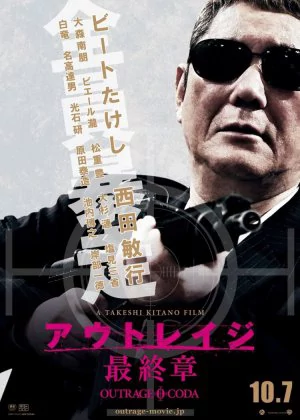Outrage Coda
Takeshi Kitano is finally back to finish his Yakuza trilogy. In between the second and third installment he went on a little (not so successful) detour, before settling down to direct Outrage Coda, the final part in the Outrage series. It turned out to be a welcome diversion though, as his renewed focus allowed him to tackle the criminal disputes around Otomo once and for all. Those partial to the more serious Yakuza films will have a ball with Coda, then again, if you've seen the first two parts you should pretty much know what to expect.

Fans of Yakuza cinema don't have many options nowadays. The niche is pretty much on life support, with very few Yakuza films still being produced. The ones that do try to keep the niche alive are usually trashed and discarded by critics and audiences alike. Earlier this year Netflix' The Outsider drowned in bad reviews, sadly Kitano's Coda didn't fare much better. Apparently these films are a little too slow and talkative for current standards, no doubt fueled by the popularity of hastier TV material lowering people's attention spans.
Outrage Coda does require your full attention, it's not a film you can watch casually. There are tons of characters spread out over different Yakuza factions, all trying to get the upper hand, all trying to outsmart the others. It's like watching a game of chess, only without knowing which pieces belong to which player. Not everything is played out in the open either, which makes it even harder to keep track of everything that's happening. This is an essential part of any good Yakuza flick of course, but Kitano really elevates it to an art here.
The drama begins when Hanada, a middle-management member of the Hanabishi clan kills one of Otomo's men. This immediately sets off an entire chain of events, which ultimately results in the Hanabishi gang having to apologize for Hanada's actions. While the tension rises, different factions are seeing their chance fit to abuse the situation in order to further their own goals. When Otomo is informed about the situation, he decides its time to come out of hiding and resolve the situation himself.

On a visual level, Outrage Coda is very much in line with the previous films. The film looks stark and crisp, a look accomplished by muted colors, strong contrasts and very strict camera work. There aren't many sexy or stand-out shots, just a constant level of high visual quality. You'll find a couple of Kitano's landmark compositions throughout, but none of the visual quirkiness that defined his earlier films. I didn't really miss it here though, as Kitano clearly went for a more serious approach of the Yakuza genre.
The music is similarly understated, but I have to say it did have a really big impact on the atmosphere. By combining electronic sounds with jazzy influences, composer Keiichi Suzuki created a very ominous and brooding score, instilling gravity and severeness whenever things get serious. I've always felt Hisaishi's departure left a void in Kitano's films, but Suzuki's score is so successful that Hisaishi's replacement almost felt necessary to make this film a success. I'm not sure how Coda would've fared with Hisaishi's dreamier approach to music, to even get me to that point is a big compliment for Suzuki.
Outrage Coda has a pretty extensive cast with many familiar faces, especially for those who are used to watching Japanese films. Kitano himself is of course the star of the film, but partner in crime Ren Osugi gets a sizeable part, Nao Ohmori is a very welcome addition while Toshiyuki Nishida delivers one of the best performances of his career. The rest of the cast does an excellent job too, though few are able to excel on their own as the film doesn't spend too much time exploring individual characters.

Looking at all three Outrage films combined, it's a trilogy that isn't so much concerned with individual characters as it is with the ever-morphing Yakuza body as a whole. Just like chess, there are a lot of pieces on the board, but ultimately there is only one winner and after the game is finished the board always reset itself to its initial state. While people come and go and power balances shift in different directions, the Yakuza framework remains mostly unaltered and history keeps repeating itself.
Outrage offers a pretty fresh take on the genre, even though individual genre elements remain very familiar. Coda serves a worthy ending to the trilogy, sporting an excellent cast, stark and beautiful cinematography and a stunning score. People expecting a more traditional Yakuza film may be disappointed with the lack of narrative and character focus, but that's really missing the point of the films. I wonder where Kitano will go from here, but if this turns about to be his swan song, he goes out on a high note.
